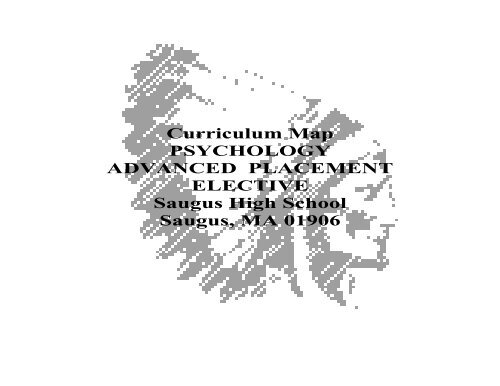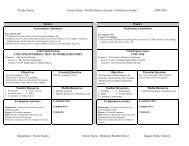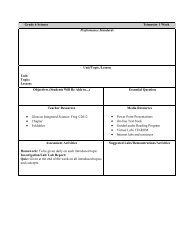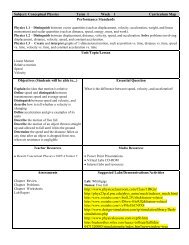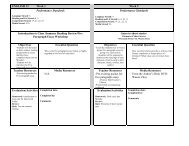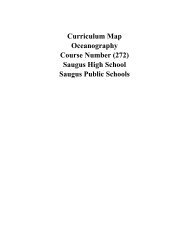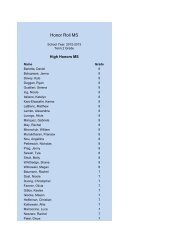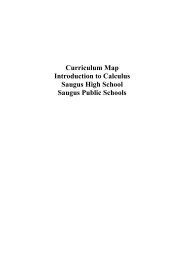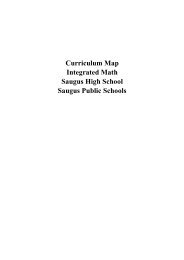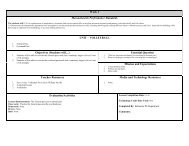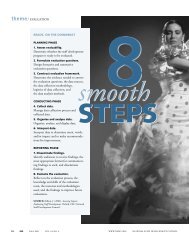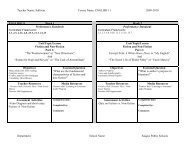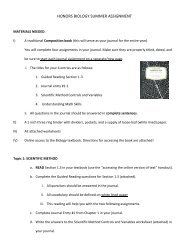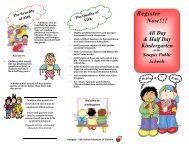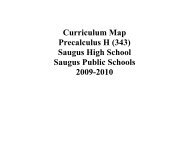Curriculum Map PSYCHOLOGY ADVANCED PLACEMENT ...
Curriculum Map PSYCHOLOGY ADVANCED PLACEMENT ...
Curriculum Map PSYCHOLOGY ADVANCED PLACEMENT ...
Create successful ePaper yourself
Turn your PDF publications into a flip-book with our unique Google optimized e-Paper software.
<strong>Curriculum</strong> <strong>Map</strong><br />
<strong>PSYCHOLOGY</strong><br />
<strong>ADVANCED</strong> <strong>PLACEMENT</strong><br />
ELECTIVE<br />
Saugus High School<br />
Saugus, MA 01906
March 2000<br />
SAUGUS HIGH SCHOOL SOCIAL STUDIES DEPARTMENT<br />
MISSION STATEMENT*<br />
The Saugus High School Social Studies Department is committed to academic excellence in education,<br />
promoting cultural enrichment and citizenship. Through the use of student-based learning, a variety of<br />
assessment models, and the integration of innovative pedagogic techniques, our department has focused its<br />
programs around the following:<br />
STUDENT EXPECTATIONS<br />
1. AUTONOMOUS LEARNING SKILLS<br />
• Takes responsibility for his/her own learning<br />
• Accepts the responsibilities of citizenship<br />
• Can set priorities and identify achievable goals<br />
2. CRITICAL THINKING<br />
• Listens and reads actively land thinks critically in a variety of genres<br />
• Analyzes and evaluates information<br />
• Demonstrates the ability to select, synthesize, organize and develop ideas<br />
3. EFFECTIVE WRITING SKILLS<br />
• Communicates ideas and information with coherence, clarity, and understanding of audience<br />
• Integrates the use of a variety of communication forms<br />
4. PROBLEM SOLVING SKILLS<br />
• Utilizes and evaluates multiple problem solving strategies<br />
• Generates new and creative ideas by taking risks to solve problems<br />
• Applies problem solving techniques in a variety of disciplines<br />
5. PERSONAL AND SOCIAL RESPONSIBILITY<br />
• Takes responsibility for personal actions, demonstrates honesty, fairness, and integrity<br />
• Respects ones own cultures and others<br />
• Appreciates diversity and acts responsibly as a member of the community by participating in a<br />
variety of activities which demonstrate civic pride
STUDENT GOALS<br />
• Providing a factual base of knowledge and skills in order to develop higher order thinking i.e. critical<br />
thinking ability, problem solving, decision making, organizing and planning<br />
• Continuing the process of implementing technology<br />
• Fostering an appreciation of world cultures and history, as well as the cultural diversity of the United<br />
States<br />
• Meeting the dictates of the Frameworks for History and Social Science as determined by the<br />
Commonwealth of Massachusetts (August 2003)<br />
• Developing an interdisciplinary curriculum associating the social sciences with the study of humanities,<br />
as well as the core curriculum<br />
• Relating contemporary issues to course offerings<br />
• Encouraging civic and social responsibility<br />
* In conjunction with the Saugus High School Mission Statement (2000)
SEMESTER 1 <strong>ADVANCED</strong> <strong>PLACEMENT</strong> <strong>PSYCHOLOGY</strong> ELECTIVE (165)<br />
Week 1 Week 2<br />
Performance Standards<br />
Performance Standards<br />
-Review Summer Reading Assignment<br />
a) Research<br />
b) Sub-fields<br />
c) History<br />
-Begin discussion of chapter content<br />
-Review Summer Book Test<br />
- Walden Two<br />
- Man Who Mistook His<br />
- Wife for a Hat<br />
1. Chapter 2, Pg. 29-40<br />
-Thinking Critically<br />
-Research Methods<br />
-Statistical Analysis<br />
2. Chapter 1, Pg. 3-29<br />
-World of Psychology<br />
-Unity and Diversity<br />
Unit/Topic/Lesson<br />
UNIT ONE, TWO<br />
Unit/Topic/Lesson<br />
UNIT ONE, TWO<br />
Reading, discussion, analysis<br />
Objectives (Students will…)<br />
-Define psychology<br />
-Apply psychology to the understanding of<br />
how it effects human welfare.<br />
Essential Question<br />
How can psychology help you<br />
understand yourself?<br />
Objectives (Students will…)<br />
-Assess summer reading, specifically<br />
Walden Two.<br />
Determine the level of critical thinking<br />
skills needed for AP success.<br />
Essential Question<br />
How does behavior<br />
modification work in Walden<br />
Two?<br />
Teacher Resources<br />
Psychology, Bernstein et al<br />
(HoughlinMifflin) 5 th Ed<br />
AP <strong>Curriculum</strong> Supplementals<br />
Media Resources<br />
Powerpoint<br />
Teacher Resources<br />
Psychology, Bernstein et al<br />
(HoughlinMifflin) 5 th Ed<br />
AP <strong>Curriculum</strong> Supplementals<br />
Media Resources<br />
Powerpoint<br />
Evaluation/Activities<br />
1. Performance Assessment Activities<br />
2. Section Quizzes<br />
Completion date:<br />
Completed by:<br />
Evaluation/Activities<br />
1. Performance Assessment Activities<br />
2. Essays<br />
Completion date:<br />
Completed by:<br />
Comments: Alternative Evaluation:<br />
Paper, Project, Poster<br />
Comments: Alternative Evaluation:<br />
Paper, Project, Poster
Week 3 Week 4<br />
Performance Standards<br />
Performance Standards<br />
-Continue obligation<br />
-Continue with chapter discussions.<br />
-Introducing Psychology<br />
-Research in Psychology<br />
Unit/Topic/Lesson<br />
UNIT ONE, TWO<br />
-Reading, discussion, analysis of summer assignments in preparation<br />
for assessment<br />
-Review of test results<br />
-Summary of Chapter 2 and Chapter 1<br />
-Supplemental Materials<br />
Unit/Topic/Lesson<br />
UNIT ONE, TWO<br />
-Review of test results<br />
-Summary of Chapter 2 and Chapter 1<br />
-Supplemental Materials<br />
Objectives (Students will…)<br />
-Assess summer reading, specifically Man<br />
Who Mistook His Wife for a Hat.<br />
-Apply psychological principals to literature.<br />
Essential Question<br />
How does behavior<br />
modification work in Man<br />
Who Mistook His Wife<br />
for a Hat?<br />
Objectives (Students will…)<br />
-Understand chronological order of<br />
historical events in psychology.<br />
-Explain the meaning, implications, and<br />
importance of the contributions of<br />
early pioneers of psychology.<br />
Essential Question<br />
Who were the early pioneers<br />
of psychology?<br />
Teacher Resources<br />
Psychology, Bernstein et al<br />
(HoughlinMifflin) 5 th Ed<br />
AP <strong>Curriculum</strong> Supplementals<br />
Media Resources<br />
Powerpoint<br />
Teacher Resources<br />
Psychology, Bernstein et al<br />
(HoughlinMifflin) 5 th Ed<br />
AP <strong>Curriculum</strong> Supplementals<br />
Media Resources<br />
Powerpoint<br />
Evaluation/Activities<br />
TEST ON SUMMER ASSIGNMENT<br />
Completion date:<br />
Completed by:<br />
Evaluation/Activities<br />
Chapter Test(s) 1 and 2<br />
Completion date:<br />
Completed by:<br />
Comments: Alternative Evaluation:<br />
Paper, Project, Poster<br />
Comments: Alternative Evaluation:<br />
Paper, Project, Poster
Week 5 Week 6<br />
Performance Standards<br />
Performance Standards:<br />
-Biological Aspects of Psychology<br />
Chapter 3 Continued<br />
-Describe peripheral NS<br />
-Identify somatic NS<br />
-Identify autonomic NS<br />
1. Chapter 3, Pg. 53-56<br />
-Nervous Systen<br />
-Neurons<br />
-Neural Communication<br />
2. Supplemental Materials<br />
Unit/Topic/Lesson<br />
UNIT THREE<br />
Unit/Topic/Lesson<br />
UNIT THREE<br />
1. Chapter 3, Pg. 61<br />
-Peripheral Nervous System<br />
-Keeping in Touch with the World<br />
2. Supplemental Materials<br />
Objectives (Students will…)<br />
-Explain the scope of behavior and mental<br />
processes of human beings and animals.<br />
Essential Question<br />
How does neural communication<br />
help you to understand<br />
yourself?<br />
Objectives (Students will…)<br />
-Examine the peripheral nervous<br />
system—somatic and autonomic.<br />
Essential Question<br />
What are the obstacles in<br />
decision making?<br />
Teacher Resources<br />
Psychology, Bernstein et al<br />
(HoughlinMifflin) 5 th Ed<br />
AP <strong>Curriculum</strong> Supplementals<br />
Media Resources<br />
Video: Series—Discovering<br />
Psychology<br />
Teacher Resources<br />
Psychology, Bernstein et al<br />
(HoughlinMifflin) 5 th Ed<br />
AP <strong>Curriculum</strong> Supplementals<br />
Media Resources<br />
Powerpoint<br />
Evaluation/Activities<br />
1. Performance Assessment Activities<br />
2. Problem Based Activities<br />
Completion date:<br />
Completed by:<br />
Comments: Alternative Evaluation:<br />
Paper, Project, Poster<br />
Evaluation/Activities<br />
1. Performance Assessment Activities<br />
2. Section Quizzes<br />
3. Problem Based Activities<br />
Completion date:<br />
Completed by:<br />
Comments: Alternative Evaluation:<br />
Paper, Project, Poster
Week 7 Week 8<br />
Performance Standards<br />
Performance Standards<br />
Chapter 3 Continued<br />
-Describe chemical ommunication<br />
-Identify nuerotransmitte RS<br />
Chapter 3 Continued<br />
-Discuss sympathitic and parasympathitic NS<br />
-Identify central NS<br />
1. Chapter 3, Pg. 82-84<br />
-Chemistry of Psychology<br />
-Thinking Critically<br />
2. Supplemental Materials<br />
Unit/Topic/Lesson<br />
UNIT THREE<br />
Unit/Topic/Lesson<br />
UNIT THREE<br />
1. Chapter 3, Pg. 61-62<br />
-Somatic Nervous System<br />
-Autonomatic Nervous System<br />
2. Supplemental Materials<br />
Objectives (Students will…)<br />
-Identify seven major neurotransmitters.<br />
Essential Question<br />
Which neurotransmitters<br />
occur in which structures?<br />
How do neurotransmitters<br />
affect behavior?<br />
Objectives (Students will…)<br />
-Examine the two divisions of the<br />
autonomic nervous system—<br />
sympathetic and parasympathetic.<br />
Essential Question<br />
How does your motivation aid<br />
emotional work?<br />
Teacher Resources<br />
Psychology, Bernstein et al<br />
(HoughlinMifflin) 5 th Ed<br />
AP <strong>Curriculum</strong> Supplementals<br />
Media Resources<br />
Video: Series—Discovering<br />
Psychology<br />
Teacher Resources<br />
Psychology, Bernstein et al<br />
(HoughlinMifflin) 5 th Ed<br />
AP <strong>Curriculum</strong> Supplementals<br />
Media Resources<br />
Powerpoint<br />
Evaluation/Activities<br />
1. Performance Assessment<br />
Activities<br />
2. Section Quizzes<br />
3. Problem Based Activities<br />
4. Test on Supplementals<br />
Completion date:<br />
Completed by:<br />
Comments: Alternative Evaluation:<br />
Paper, Project, Poster<br />
Evaluation/Activities<br />
1. Performance Assessment<br />
Activities<br />
2. Section Quizzes<br />
3. Problem Based Activities<br />
Completion date:<br />
Completed by:<br />
Comments: Alternative Evaluation:<br />
Paper, Project, Poster
Week 9 Week 10<br />
Performance Standards<br />
Performance Standards<br />
Chapter 3 Continued<br />
Identify parts and functions of the central nervous system<br />
Chapter 3 Continued<br />
-Describe the endocrine<br />
system<br />
-Describe hormones<br />
1. Chapter 3, Pg. 63-80<br />
-Spinal Cord<br />
-Brain<br />
2. Focus on Research<br />
3. Linkages<br />
Unit/Topic/Lesson<br />
UNIT THREE<br />
1. Chapter 3, Pg 87-88<br />
-Endocrine System<br />
-Internal World<br />
2. Supplemental Materials<br />
Unit/Topic/Lesson<br />
UNIT THREE<br />
Objectives (Students will…)<br />
-Understand how human brains work and how<br />
they relate to sensory and motor system<br />
Teacher Resources<br />
Psychology, Bernstein et al<br />
(HoughlinMifflin) 5 th Ed<br />
AP <strong>Curriculum</strong> Supplementals<br />
Essential Question<br />
What are the changes that take<br />
place in the brain that might<br />
produce Parkinson’s disease and<br />
Alzheimer’s disease?<br />
How have PET scans and functional<br />
MRI scans helped to answer this<br />
question?<br />
Media Resources<br />
Video: Series—Discovering<br />
Psychology<br />
Objectives (Students will…)<br />
-Describe the endocrine system.<br />
Teacher Resources<br />
Psychology, Bernstein et al<br />
(HoughlinMifflin) 5 th Ed<br />
AP <strong>Curriculum</strong> Supplementals<br />
Essential Question<br />
How does the endocrine system<br />
regulate functions ranging from<br />
stress responses to physical<br />
growth?<br />
Media Resources<br />
Powerpoint<br />
Evaluation/Activities<br />
1. Performance Assessment<br />
Activities<br />
2. Section Quizzes<br />
3. Problem Based Activities<br />
Completion date:<br />
Completed by:<br />
Comments: Alternative Evaluation:<br />
Paper, Project, Poster<br />
Evaluation/Activities<br />
1. Performance Assessment<br />
Activities<br />
3. Test on Supplementals<br />
Completion date:<br />
Completed by:<br />
Comments: Alternative Evaluation:<br />
Paper, Project, Poster
Week 11 Week 12<br />
Performance Standards<br />
Performance Standards<br />
Chapter 3 Continued<br />
-Discuss immune system<br />
-Identify glands<br />
-Identify hormones<br />
-Cognitive and Language<br />
1. Chapter 3 Pg. 87-90<br />
-Immune System<br />
-Linking the Brain<br />
-Body’s Defense System<br />
2. Linkages<br />
3. Summary<br />
4. Key Terms<br />
Unit/Topic/Lesson<br />
UNIT THREE<br />
1. Chapter 8, Pg. 250<br />
-Basic Functions of Thought<br />
- Circle of Thought<br />
2. Supplemental Materials<br />
Unit/Topic/Lesson<br />
UNIT EIGHT<br />
Objectives (Students will…)<br />
-Identify major glands of the endocrine<br />
system.<br />
-Identify major hormones of the endocrine<br />
system.<br />
Teacher Resources<br />
Psychology, Bernstein et al<br />
(HoughlinMifflin) 5 th Ed<br />
AP <strong>Curriculum</strong> Supplementals<br />
Essential Question<br />
What is the “fight-or-flight<br />
syndrome.”<br />
Media Resources<br />
Video: Series—Discovering<br />
Psychology<br />
Objectives (Students will…)<br />
-Explain the 5 core functions of<br />
thought.<br />
-Visualize the “circle of thought”.<br />
Teacher Resources<br />
Psychology, Bernstein et al<br />
(HoughlinMifflin) 5 th Ed<br />
AP <strong>Curriculum</strong> Supplementals<br />
Essential Question<br />
How does understanding your<br />
thought process help you<br />
understand yourself?<br />
Media Resources<br />
Powerpoint<br />
Evaluation/Activities<br />
1. Performance Assessment<br />
2. Section Quizzes<br />
3. Chapter Test 3<br />
Completion date:<br />
Completed by:<br />
Comments: Alternative Evaluation:<br />
Paper, Project, Poster<br />
Evaluation/Activities<br />
1. Performance Assessment<br />
2. Section Quizzes<br />
3. Test on Supplementals<br />
Completion date:<br />
Completed by:<br />
Comments: Alternative Evaluation:<br />
Paper, Project, Poster
Week 13 Week 14<br />
Performance Standards<br />
Performance Standards<br />
Chapter 8 Continued<br />
-Discuss reaction time<br />
-Identify mental representations<br />
Chapter 8 Continued<br />
-Identify cognitive maps<br />
-Identify schemas<br />
Unit/Topic/Lesson<br />
UNIT EIGHT<br />
1. Chapter 8, Pg. 252-253<br />
-Information Processing Speed: Reaction Time<br />
-Picturing Information Processing: Evoking Brain Potentials<br />
-Mental Representations<br />
Unit/Topic/Lesson<br />
UNIT EIGHT<br />
1. Chapter 8, Pg. 254<br />
-Concept Schemas and Event Scripts<br />
2. Supplemental Materials<br />
Objectives (Students will…)<br />
-Describe the research on<br />
“information-processing speed: reaction<br />
time”.<br />
-Describe the research on “picturing<br />
information processing: evoked brain<br />
potentials”.<br />
Essential Question<br />
How can you explain “stimulusresponse”<br />
compatibility?<br />
Objectives (Students will…)<br />
-Understand mental representation: the<br />
ingredients of thought.<br />
Essential Question<br />
Why does describing and timing of the<br />
process of thinking tell only part of the<br />
story behind the “circle of thought”?<br />
Teacher Resources<br />
Psychology, Bernstein et al<br />
(HoughlinMifflin) 5 th Ed<br />
AP <strong>Curriculum</strong> Supplementals<br />
Media Resources<br />
Powerpoint<br />
Teacher Resources<br />
Psychology, Bernstein et al<br />
(HoughlinMifflin) 5 th Ed<br />
AP <strong>Curriculum</strong> Supplementals<br />
Media Resources<br />
Powerpoint<br />
Evaluation/Activities<br />
1. Performance Assessment<br />
2. Section Quizzes<br />
3. Problem Based Activities<br />
Completion date:<br />
Completed by:<br />
Comments: Alternative Evaluation:<br />
Paper, Project, Poster<br />
Evaluation/Activities<br />
1. Performance Assessment<br />
2. Section Quizzes<br />
3. Test on Supplementals<br />
Completion date:<br />
Completed by:<br />
Comments: Alternative Evaluation:<br />
Paper, Project, Poster
Week 15 Week 16<br />
Performance Standards<br />
Performance Standards<br />
Chapter 8 Continued<br />
-Describe thinking strategies<br />
-Identify formal and informal reasoning<br />
1. Chapter 8, Pg. 257<br />
-Thinking Strategies<br />
-Formal Reasoning<br />
2. Supplemental Materials<br />
Unit/Topic/Lesson<br />
UNIT EIGHT<br />
Chapter 8 Continued<br />
-Describe problem solving<br />
-Identify obstacles<br />
-Identify skills<br />
-Identify decision making<br />
-Identify strategies<br />
1. Chapter 8, Pg. 265-271<br />
-Focus on Research Methods<br />
-Decision Making<br />
2. Supplemental Materials<br />
Unit/Topic/Lesson<br />
UNIT EIGHT<br />
Objectives (Students will…)<br />
-Discuss “reasoning” –the process through<br />
which people generate and evaluate<br />
arguments, and reach conclusions.<br />
Essential Question<br />
How do problem solving techniques<br />
help you?<br />
Are there cultural differences in formal<br />
reasoning?<br />
Objectives (Students will…)<br />
-Identify the obstacles to problem<br />
solving.<br />
Essential Question<br />
What are the difficulties that<br />
occur at the start, during the<br />
diagnosis stage, when a<br />
person forms and then tests<br />
hypotheses about a problem?<br />
Teacher Resources<br />
Psychology, Bernstein et al<br />
(HoughlinMifflin) 5 th Ed<br />
AP <strong>Curriculum</strong> Supplementals<br />
Media Resources<br />
Powerpoint<br />
Teacher Resources<br />
Psychology, Bernstein et al<br />
(HoughlinMifflin) 5 th Ed<br />
AP <strong>Curriculum</strong> Supplementals<br />
Media Resources<br />
Powerpoint<br />
Evaluation/Activities<br />
Completion date:<br />
Evaluation/Activities<br />
Completion date:<br />
1. Performance Assessment<br />
2. Section Quizzes<br />
3. Test on Supplementals<br />
Completed by:<br />
Comments: Alternative Evaluation:<br />
Paper, Project, Poster<br />
1. Performance Assessment<br />
Activities<br />
2. Section Quizzes<br />
3. Chapter 8 Test<br />
Completed by:<br />
Comments: Alternative Evaluation:<br />
Paper, Project, Poster
Motivation and Emotion<br />
Week 17 Week 18<br />
Performance Standards<br />
Performance Standards<br />
Chapter 11 Continued<br />
-Identify instinct theory<br />
-Identify drive reduction<br />
theory<br />
-Describe arousal theory<br />
1. Chapter 11, Pg. 358-359<br />
-Sources of Motivation<br />
-Instinct Theory and Its<br />
Descendants<br />
2. Supplemental Materials<br />
Unit/Topic/Lesson<br />
UNIT ELEVEN<br />
1. Chapter 11, Pg. 358-360<br />
-Drive Reduction Theory<br />
-Arousal Theory<br />
-Incentive Theory<br />
2. Supplemental Materials<br />
Unit/Topic/Lesson<br />
UNIT ELEVEN<br />
Objectives (Students will…)<br />
-Explain sources of motivation.<br />
Essential Question<br />
Can motivation be directly<br />
observed?<br />
Objectives (Students will…)<br />
-Examine instinct theory<br />
and its descendents.<br />
Essential Question<br />
Is it possible that some<br />
aspects of human<br />
motivation are innate<br />
Teacher Resources<br />
Psychology, Bernstein et al<br />
(HoughlinMifflin) 5 th Ed<br />
AP <strong>Curriculum</strong> Supplementals<br />
Media Resources<br />
Video: Series—Discovering<br />
Psychology<br />
Teacher Resources<br />
Psychology, Bernstein et al<br />
(HoughlinMifflin) 5 th Ed<br />
AP <strong>Curriculum</strong> Supplementals<br />
Media Resources<br />
Video: Series—Discovering<br />
Psychology<br />
Evaluation/Activities<br />
1. Performance Assessment<br />
Activities<br />
2. Problem Based Activities<br />
3. Test on Supplements<br />
Completion date:<br />
Completed by:<br />
Comments: Alternative Evaluation:<br />
Paper, Project, Poster<br />
Evaluation/Activities<br />
1. Essays<br />
2. Section Quizzes<br />
3. Chapter 11 Test<br />
Completion date:<br />
Completed by:<br />
Comments: Alternative Evaluation:<br />
Paper, Project, Poster
Week 19 Week 20<br />
Performance Standards<br />
REVIEW FOR MID YEAR EXAM<br />
Performance Standards<br />
MID YEAR EXAM WEEK<br />
Unit/Topic/Lesson<br />
UNITS<br />
REVIEW AP <strong>PSYCHOLOGY</strong> CURRICULUM<br />
Unit/Topic/Lesson<br />
Objectives (Students will…)<br />
-Demonstrate knowledge of content material as<br />
presented in Semester 1<br />
-Understand test-taking strategies: multiple choice,<br />
open response, and primary source documents<br />
Essential Question<br />
What do students know and are able to<br />
do?<br />
Objectives (Students will…)<br />
Essential Question<br />
Teacher Resources<br />
Study Guides and Preview Materials<br />
Media Resources Teacher Resources Media Resources<br />
Evaluation/Activities<br />
MID YEAR STANDARDIZED<br />
EXAM FOR AP <strong>PSYCHOLOGY</strong><br />
IN PREPARATION FOR AP<br />
EXAM GIVEN IN MAY<br />
Completion date:<br />
Completed by:<br />
Comments<br />
Evaluation<br />
MID YEAR<br />
STANDARDIZED EXAM<br />
FOR AP <strong>PSYCHOLOGY</strong> IN<br />
PREPARATION FOR AP<br />
EXAM GIVEN IN MAY<br />
Completion date:<br />
Completed by:<br />
Comments
SEMESTER 2 <strong>ADVANCED</strong> <strong>PLACEMENT</strong> <strong>PSYCHOLOGY</strong> ELECTIVE (165)<br />
Week 21 Week 22<br />
Performance Standards<br />
Performance Standards<br />
Sensation<br />
Perception<br />
1. Chapter 4, Pg. 96-125<br />
-Sensory Systems<br />
-Hearing<br />
-Vision<br />
-Chemical Senses<br />
-Somatic Senses<br />
2. Thinking Critically<br />
Unit/Topic/Lesson<br />
UNIT<br />
Unit/Topic/Lesson<br />
UNIT<br />
1. Chapter 5, Pg. 138-164<br />
-Perception Paradox<br />
-Three Approaches to Perception<br />
-Psychophysics<br />
2. Thinking Critically<br />
3. Perceptual World<br />
Objectives (Students will…)<br />
-Define sense, sensation<br />
-Understand how sensory systems create<br />
reality<br />
-Explain the first steps of the<br />
sensation-perception process.<br />
Essential Question<br />
How can human beings, with<br />
our sense organs and brains,<br />
create our own realities?<br />
Objectives (Students will…)<br />
-Define perception<br />
-Explain the three approaches<br />
to perception<br />
-Summarize the various approaches<br />
that psychologists have taken in trying<br />
to understand the complexity of<br />
perceptual processes.<br />
Essential Question<br />
Can subliminal stimuli<br />
influence your behavior?<br />
Teacher Resources<br />
Psychology, Bernstein et al<br />
(HoughlinMifflin) 5 th Ed<br />
AP <strong>Curriculum</strong> Supplementals<br />
Media Resources<br />
Computer Research: The<br />
Case of the Disembodied<br />
Woman<br />
Teacher Resources<br />
Psychology, Bernstein et al<br />
(HoughlinMifflin) 5 th Ed<br />
AP <strong>Curriculum</strong> Supplementals<br />
Media Resources<br />
Computer Research<br />
Evaluation/Activities<br />
1. Performance Assessment<br />
Activities<br />
2. Section Quizzes<br />
3. Chapter 4 Test<br />
Completion date:<br />
Completed by:<br />
Comment: Alternative Evaluation:<br />
Paper, Project, Poster<br />
Evaluation/Activities<br />
1. Performance Assessment<br />
2. Section Quizzes<br />
3. Chapter 5 Test<br />
Completion date:<br />
Completed by:<br />
Comments: Alternative Evaluation:<br />
Paper, Project, Poster
Learning<br />
Week 23 Week 24<br />
Performance Standards<br />
Performance Standards<br />
Chapter 6 Continued<br />
-Describe observational learning<br />
-Identify Latent learning and Cognitive maps<br />
-Discuss research and styles<br />
1. Chapter 6, Pg. 176-196<br />
-Learning About Stimuli<br />
-Classical Conditioning<br />
-Operant Conditioning<br />
2. Supplemental Materials<br />
Unit/Topic/Lesson<br />
UNIT<br />
1. Chapter 6, Pg. 197-208<br />
-Cognitive Processes<br />
-Using Research<br />
2. Linkages<br />
3. Summary<br />
4. Key Terms<br />
Unit/Topic/Lesson<br />
UNIT<br />
Objectives (Students will…)<br />
-Define learning<br />
-Explain psychologists’ research on the<br />
content, causes, and course of<br />
learning.<br />
Essential Question<br />
Is learning a slow<br />
cumulative process requiring lots of<br />
practice, or<br />
does it involve sudden flashes of<br />
insight?<br />
Objectives (Students will…)<br />
-Explain the cognitive approach in<br />
learning<br />
-Compare how psychologists in the<br />
early 1900’s viewed classical and<br />
operant conditioning to new research<br />
on the subject.<br />
Essential Question<br />
Does watching violence on<br />
television make people more<br />
violent?<br />
Teacher Resources<br />
Psychology, Bernstein et al<br />
(HoughlinMifflin) 5 th Ed<br />
AP <strong>Curriculum</strong> Supplementals<br />
Media Resources<br />
Computer Research<br />
Teacher Resources<br />
Psychology, Bernstein et al<br />
(HoughlinMifflin) 5 th Ed<br />
AP <strong>Curriculum</strong> Supplementals<br />
Media Resources<br />
Computer Research<br />
Video Series—Discovering<br />
Psychology<br />
Evaluation/Activities<br />
1. Problem Based Activities<br />
2. Section Quizzes<br />
3. Test on Supplements<br />
Completion date:<br />
Completed by:<br />
Comments: Alternative Evaluation:<br />
Paper, Project, Poster<br />
Evaluation/Activities<br />
Chapter 6 Test<br />
Completion date:<br />
Completed by:<br />
Comments: Alternative Evaluation:<br />
Paper, Project, Poster
Week 25 Week 26<br />
Performance Standards<br />
Performance Standards<br />
Memory<br />
Chapter 7 Continued<br />
-Describe the retrieval of memories<br />
-Identify state and context dependence<br />
-Describe forgetting<br />
1. Chapter 7, Pg. 214-226<br />
-Nature of Memory<br />
-Acquiring New Memories<br />
2. Focus on Research<br />
Unit/Topic/Lesson<br />
UNIT<br />
1. Chapter 7, Pg. 227-234<br />
-Retrieving Memories<br />
-Forgetting<br />
2. Thinking Critically<br />
Unit/Topic/Lesson<br />
UNIT<br />
Objectives (Students will…)<br />
Examine the nature of memory<br />
Essential Question<br />
How would it be possible to<br />
measure implicit memory?<br />
Objectives (Students will…)<br />
-Describe the retrieval of memories<br />
Essential Question<br />
Do forgotten memories<br />
remain in the subconscious?<br />
Teacher Resources<br />
Psychology, Bernstein et al<br />
(HoughlinMifflin) 5 th Ed<br />
AP <strong>Curriculum</strong> Supplementals<br />
Media Resources<br />
Computer Research: Models<br />
of Memory<br />
Teacher Resources<br />
Psychology, Bernstein et al<br />
(HoughlinMifflin) 5 th Ed<br />
AP <strong>Curriculum</strong> Supplementals<br />
Media Resources<br />
Video Series—Discovering<br />
Psychology<br />
Evaluation/Activities<br />
1. Case Studies<br />
2. Performance Assessment<br />
Activities<br />
3. Section Quizzes<br />
Completion date:<br />
Completed by:<br />
Comments: Alternative Evaluation:<br />
Paper, Project, Poster<br />
Evaluation/Activities<br />
1. Performance Assessment<br />
Activities<br />
2. Section Quizzes<br />
Completion date:<br />
Completed by:<br />
Comments: Alternative Evaluation:<br />
Paper, Project, Poster
Chapter 14 Continued<br />
-Describe personality theory<br />
-Describe psychodynamic theory<br />
-Describe trait factors<br />
a) factor analysis<br />
b) Big 5 Model<br />
1. Chapter 14, Pg. 489-508<br />
-Trait Approach<br />
-Social-Cognitive Approach<br />
-Phenomenological Approach<br />
2. Linkages<br />
3. Summary<br />
4. Vocabulary<br />
Week 29 Week 30<br />
Performance Standards<br />
Performance Standards<br />
Chapter 14 Continued<br />
-Objective Tests<br />
-Projective Tests<br />
-Personality Tests and<br />
Employee Selection<br />
Unit/Topic/Lesson<br />
UNIT<br />
1. Chapter 14, Pg 508-512<br />
2. Personality Tests<br />
3. Discuss Tests<br />
Unit/Topic/Lesson<br />
UNIT<br />
Objectives (Students will…)<br />
-Compare traits versus types.<br />
-Apply Allport’s Trait Theory and Eysenck’s<br />
Biological Trait Theory<br />
Essential Question<br />
Are personality traits inherited?<br />
Objectives (Students will…)<br />
Evaluate objective tests, projective<br />
tests, and personality<br />
tests and employee selection<br />
Essential Question<br />
If you were a psychologist hired<br />
by a company whose job it is to<br />
hire honest, cooperative, hard<br />
working employees, how would<br />
you know which candidates have<br />
these characteristics?<br />
Teacher Resources<br />
Psychology, Bernstein et al<br />
(HoughlinMifflin) 5 th Ed<br />
AP <strong>Curriculum</strong> Supplementals<br />
Media Resources<br />
Powerpoint<br />
Teacher Resources<br />
Psychology, Bernstein et al<br />
(HoughlinMifflin) 5 th Ed<br />
AP <strong>Curriculum</strong> Supplementals<br />
Media Resources<br />
Powerpoint<br />
Evaluation/Activities<br />
1. Problem Based Activities<br />
Completion date:<br />
Completed by:<br />
Comments: Alternative Evaluation:<br />
Paper, Project, Poster<br />
Evaluation/Activities<br />
1. Case Studies<br />
2. Personality Tests<br />
3. Chapter 14 Test<br />
Completion date:<br />
Completed by:<br />
Comments: Alternative Evaluation:<br />
Paper, Project, Poster
Week 31 Week 32<br />
Performance Standards<br />
Performance Standards<br />
Psychological Disorders<br />
Chapter 15 Continued<br />
-Psychological Disorders<br />
-Classification<br />
-Identifying Disorders<br />
a) anxiety<br />
b) personality<br />
-Identifying Psychological Disorders<br />
Unit/Topic/Lesson<br />
UNIT<br />
1. Chapter 15, Pg. 517-528<br />
-Basic Issues<br />
-Classifying Psychological Disorders<br />
-Anxiety Disorders<br />
2. Thinking Critically<br />
1. Chapter 15, Pg. 535-538<br />
-Somatoform Disorders<br />
-Dissociative Disorders<br />
-Mood Disorders<br />
2. Focus on Research<br />
3. Linkages<br />
Unit/Topic/Lesson<br />
UNIT<br />
Objectives (Students will…)<br />
-Identify psychological disorders<br />
-Examine five ways of explaining<br />
psychopathology<br />
Essential Question<br />
How do societies define what<br />
is abnormal?<br />
Objectives (Students will…)<br />
-Identify dissociative disorders<br />
-Examine ways dissociative<br />
disorders develop<br />
Essential Question<br />
Can people forget traumatic<br />
childhood memories?<br />
Teacher Resources<br />
Psychology, Bernstein et al<br />
(HoughlinMifflin) 5 th Ed<br />
AP <strong>Curriculum</strong> Supplementals<br />
Media Resources<br />
Video Series—Discovering<br />
Psychology<br />
Teacher Resources<br />
Psychology, Bernstein et al<br />
(HoughlinMifflin) 5 th Ed<br />
AP <strong>Curriculum</strong> Supplementals<br />
Media Resources<br />
Powerpoint<br />
Evaluation/Activities<br />
1. Performance Assessment<br />
Activities<br />
2. Section Quizzes<br />
3. Problem Based Activities<br />
Completion date:<br />
Completed by:<br />
Comments: Alternative Evaluation:<br />
Paper, Project, Poster<br />
Evaluation/Activities<br />
1. Case Studies<br />
2. Chapter 15 Test<br />
Completion date:<br />
Completed by:<br />
Comments: Alternative Evaluation:<br />
Paper, Project, Poster
Week 33 Week 34<br />
Performance Standards<br />
Performance Standards:<br />
Treatment of Psychological<br />
Disorders<br />
Chapter 16 Continued<br />
-Describe mental illness and the law<br />
-Describe basic treatments<br />
-Describe psychoanalytical approach<br />
Unit/Topic/Lesson<br />
UNIT<br />
1. Chapter 16, Pg. 562-587<br />
-Basic Features of Treatment<br />
-Psychodynamic Psychotherapy<br />
-Phenomenological Psychotherapy<br />
-Behavior Therapy<br />
-Group, Family, Couples Therapy<br />
-Evaluating Psychotherapy<br />
2. Supplemental Materials<br />
1. Chapter 16, Pg. 564-589<br />
-Biological Treatments<br />
2. Critically Thinking<br />
3. Focus on Research<br />
4. Supplemental Materials<br />
Unit/Topic/Lesson<br />
UNIT<br />
Objectives (Students will…)<br />
. -Understand basic treatment of psychological<br />
disorders<br />
-Compare group, family, and couples therapy.<br />
Essential Question<br />
Can people learn their way out of a<br />
disorder?<br />
Objectives (Students will…)<br />
-Explain Freud’s method of<br />
psychoanalysis<br />
-Discuss variations of psychoanalysis<br />
developed by the neo-Freudian<br />
theorists<br />
Essential Question<br />
What is the difference between<br />
psychiatrists, psychologists, and<br />
other therapy providers?<br />
Teacher Resources<br />
Psychology, Bernstein et al<br />
(HoughlinMifflin) 5 th Ed<br />
AP <strong>Curriculum</strong> Supplementals<br />
Media Resources<br />
Computer Research:<br />
Experiments on Psychotherapy<br />
Teacher Resources<br />
Psychology, Bernstein et al<br />
(HoughlinMifflin) 5 th Ed<br />
AP <strong>Curriculum</strong> Supplementals<br />
Media Resources<br />
Computer Research<br />
Evaluation/Activities<br />
1. Performance Assessment<br />
Activities<br />
2. Section Quizzes<br />
3. Problem Based Activities<br />
Completion date:<br />
Completed by:<br />
Comments: Alternative Evaluation:<br />
Paper, Project, Poster<br />
Evaluation/Activities<br />
1. Section Quizzes<br />
2. Case Studes<br />
Completion date:<br />
Completed by:<br />
Comments: Alternative Evaluation:<br />
Paper, Project, Poster
Week 35 Week 36<br />
Performance Standards<br />
Performance Standards<br />
Chapter 16 Continued<br />
-Identify biological treatments<br />
-Discuss research of psychoanalysis treatments<br />
Social Cognition<br />
Unit/Topic/Lesson<br />
UNIT<br />
1.Chapter 16, Pg. 598<br />
-Community Psychology: From Treatment to Prevention<br />
2. Linkages<br />
3. Summary<br />
4. Key Terms<br />
1. Chapter 17, Pg. 604-616<br />
-Self Influences<br />
-Social Perception<br />
-Explaining Behavior<br />
2. Linkages<br />
3. Focus on Research<br />
4. Chapter 14, Pg. 609<br />
Unit/Topic/Lesson<br />
UNIT<br />
Objectives (Students will…)<br />
-Explain community psychology from<br />
treatment to prevention.<br />
Teacher Resources<br />
Psychology, Bernstein et al<br />
(HoughlinMifflin) 5 th Ed<br />
AP <strong>Curriculum</strong> Supplementals<br />
Essential Question<br />
How successful was the<br />
deinstitutionalization process<br />
of the 1960’s?<br />
Media Resources<br />
Powerpoint<br />
Objectives (Students will…)<br />
-Discuss social influences on the self<br />
-Define social perception<br />
-Explain attribution<br />
-Describe the self-protective<br />
functions of social cognition<br />
Teacher Resources<br />
Psychology, Bernstein et al<br />
(HoughlinMifflin) 5 th Ed<br />
AP <strong>Curriculum</strong> Supplementals<br />
Essential Question<br />
Can negative self-images lead<br />
to mental disorders?<br />
Media Resources<br />
Powerpoint<br />
Evaluation/Activities<br />
1. Essays<br />
2. Section Quizzes<br />
3. Chapter 16 Test<br />
Completion date:<br />
Completed by:<br />
Comments: Alternative Evaluation:<br />
Paper, Project, Poster<br />
Evaluation/Activities<br />
1. Performance Assessment<br />
Activities<br />
2. Section Quizzes<br />
3. Problem Based Activities<br />
Completion date:<br />
Completed by:<br />
Comments: Alternative Evaluation:<br />
Paper, Project, Poster
Chapter 17 Continued<br />
-Describe social comparison<br />
-Describe social perception<br />
-Identify schemas<br />
-Describe attitudes<br />
-Describe stereotypes and<br />
prejudice<br />
-Identify theories Social Influence<br />
Week 37 Week 38<br />
Performance Standards<br />
Performance Standards<br />
. Chapter 18 Continued<br />
- Identify social influence<br />
-Describe conformity and compliance<br />
-Discuss obedience, aggression, altruism<br />
-Discuss cooperation, conflict, competition<br />
1. Chapter 17, Pg. 616-622<br />
-Attitudes<br />
-Prejudice and Stereotypes<br />
2. Supplemental Materials<br />
1. Chapter 18, Pg. 634-637<br />
-Social Influence<br />
-Conformity and Compliance<br />
Unit/Topic/Lesson<br />
UNIT<br />
1. Chapter 18, Pg. 642-661<br />
-Obedience<br />
-Aggression<br />
-Altruism and Helping<br />
-Cooperation<br />
-Group Process<br />
2. Linkages<br />
3. Summary<br />
4. Vocabulary<br />
Unit/Topic/Lesson<br />
UNIT<br />
Objectives (Students will…)<br />
-Analyze attitudes—the structure, formation,<br />
and changes<br />
-Analyze prejudice and stereotypes<br />
Essential Question<br />
Is ethnic prejudice too<br />
ingrained ever to be eliminated?<br />
Objectives (Students will…)<br />
-Outline social influences<br />
-Discuss conformity and compliance<br />
-Identify obedience, aggression,<br />
altruism<br />
-Examine cooperation, competition and<br />
conflict<br />
Essential Question<br />
When and why do<br />
people conform?<br />
Teacher Resources<br />
Psychology, Bernstein et al<br />
(HoughlinMifflin) 5 th Ed<br />
AP <strong>Curriculum</strong> Supplementals<br />
Media Resources<br />
Powerpoint<br />
Teacher Resources<br />
Psychology, Bernstein et al<br />
(HoughlinMifflin) 5 th Ed<br />
AP <strong>Curriculum</strong> Supplementals<br />
Media Resources<br />
Powerpoint<br />
Evaluation/Activities<br />
1. Section Quizzes<br />
2. Case Studies<br />
3. Chapter 17 Test<br />
Completion date:<br />
Completed by:<br />
Comments: Alternative Evaluation:<br />
Paper, Project, Poster<br />
Evaluation/Activities<br />
1. Essay<br />
2. Chapter 18 Test<br />
3. AP TEST<br />
Completion date:<br />
Completed by:<br />
Comments: Alternative Evaluation:<br />
Paper, Project, Poster:
REVIEW FOR FINAL EXAM<br />
Week 39 Week 40<br />
Performance Standards<br />
Performance Standards<br />
FINAL EXAM WEEK<br />
Unit/Topic/Lesson<br />
UNITS<br />
REVIEW AP <strong>PSYCHOLOGY</strong> CURRICULUM<br />
Unit/Topic/Lesson<br />
Objectives (Students will…)<br />
-Demonstrate knowledge of content material as<br />
presented in Semester 2<br />
-Understand test-taking strategies: multiple choice,<br />
open response, and primary source documents<br />
Teacher Resources<br />
Study Guides and Preview Materials<br />
Essential Question<br />
What do students know and are able to<br />
do?<br />
Objectives (Students will…)<br />
Essential Question<br />
Media Resources Teacher Resources Media Resources<br />
Evaluation/Activities<br />
FINAL EXAM OR AP<br />
EXAM GIVEN IN MAY<br />
Completion date:<br />
Completed by:<br />
Evaluation<br />
FINAL EXAM OR AP<br />
EXAM GIVEN IN MAY<br />
Completion date:<br />
Completed by:<br />
Comments<br />
Comments


